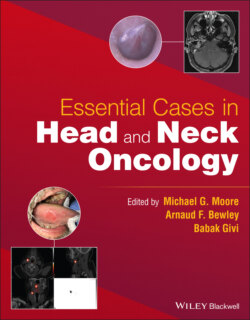Читать книгу Essential Cases in Head and Neck Oncology - Группа авторов - Страница 15
Key Points
ОглавлениеOral tongue SCC is the most common malignancy of the oral cavity. The most important risk factors are tobacco, alcohol, poor dentition, diets low in fruits and vegetables, and Fanconi anemia.
The risk of occult metastases in early stage oral cavity cancers is usually upward of 20%. Level I clinical trial evidence exists in the survival benefit of elective neck dissection in early stage tongue cancer and clinically negative cervical nodes when the depth of invasion is >3 mm. Currently, imaging techniques are not sensitive enough to identify occult metastases, and a negative CT or PET scan does not rule out microscopic metastases.
Sentinel node biopsy in oral cavity cancers has been studied and shown to be reliable enough to identify the majority of occult metastases. Sentinel node sensitivity is reported as 86% with a negative predictive value of 95% based on the European Organization for Research and Treatment of Cancer.
Recommended primary treatment of oral cavity cancers is primarily surgical. Wide local excision with a 1 cm margin and lymph node dissection (selective node dissection in clinically negative neck) is the current recommendation.
Depth of invasion is an important prognostic factor. A depth of invasion of more than 3 mm is associated with an increased risk of lymph node metastases.
The current indications for adjuvant radiotherapy are (i) close or positive margins, (ii) nodal involvement, (iii) perineural invasion, and (iv) advanced stage tumor (T3–4).
Concurrent chemotherapy with platinum‐based agents is only recommended in positive margins or extranodal extension.
